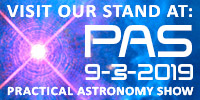Ten tips to minimise light pollution
Here’s some helpful advice for viewing the stars from a town or city.
1. Get into shadow
If you have street lights shining into your garden, do your best to find a spot that’s not illuminated by these and which can give you a good view of the sky. Getting into the shadow of a brick wall or a tree can help here. A side of a building can help too, but this can of course block your view of a large part of the sky, so you may need to hunt around for the best spot in your yard.
2. Wait for the right conditions
Artificial light is shone into the sky and is reflected back to us from dust and water vapour and atmospheric pollution. High humidity or prolonged dry spells when dust can be thrown up into the atmosphere will seem to make the situation worse. Check weather reports and wait for stable conditions with low wind speeds.
3. Get out of town
This can be easier said than done, but if you have really poor views of the stars most of the time, it really might be worth the effort to pack up your equipment and drive a few miles out of your town or city to find darker skies. You be amazed at the difference this makes.
4. Shade your optics
If you can’t shield yourself from stray light, then you can at least shield the equipment you are using. Dew shields on telescopes if short, can be extended using thick card, black or dark in colour and telescope and binocular eyepieces can also be shielded using flexible ‘wings’ which can be usually obtained from dealers. These will help reduce stray light entering your eye from the side.
5. Cover your head
Another way of shielding yourself from intrusive light is by covering your head with a dark cloth. This is surprisingly effective in getting your eyes ‘dark adapted’; allowing the pupil of your eye to dilate as fully as possible. This in turn will mean your eye is as sensitive it can be to light and will help you see those faint stars and other objects through your telescope. Don’t worry if you think it makes you look daft, no-one can see you in the dark!
6. Be nice to your neighbour
This may seem like an odd thing to suggest, but a lot of stray or unwanted light these days comes from security lights. If you have them, turn them off while observing and make sure they point at the ground at other times and if on timers, make sure they are on for as short a time as is practical. If your neighbours security lights are troublesome, then be polite and ask them to turn them off while you observe. Bring them over to show them what you are looking at; you never know, you might convert them to your hobby.
7. Coloured filters
Coloured filters screw into the bottom of the eyepiece of your telescope. They have lots of good uses in observing, not least that of enhancing details on the Moon and planets. They are also very helpful in reducing the effects of light pollution. This is because they are only allowing through the wavelengths of light of the specific colour of the filter and blocking out the other colours, particularly the orange/pink glow of streetlights.
8. Stay out late
It is a fact that stray light reduces as the night wears on. If you are able to stay out late, you’ll probably find that after midnight the amount of stray light around seems to be less than earlier in the evening. This is due to people going to bed and turning such things as outside lights off. Also some local authorities will turn street lighting down or off after midnight.
9. Specialist Filters
There are filters specifically designed to help reduce the effects of light pollution for astronomers. These often go by the name of City Light Suppression (CLS) or Anti Light Pollution (ALP) filters. These are narrow band filters that ‘tune out’ the wave lengths of light emitted by low pressure sodium street lights. These can make a significant difference when you are viewing through your telescope.
10. Take up imaging
The beauty of modern digital cameras is that it is relatively easy to manipulate the image produced in software and reduce the orange glow of a city sky with a few clicks of a computer mouse. This is of course the most expensive option, unless you already own a Digital SLR (DSLR) camera or specialist astronomical imaging camera. However, because of the sensitivity of these cameras they can often ‘see’ more than the human eye in light polluted conditions. Of course the results are even better when they are used from a truly dark sky site.





